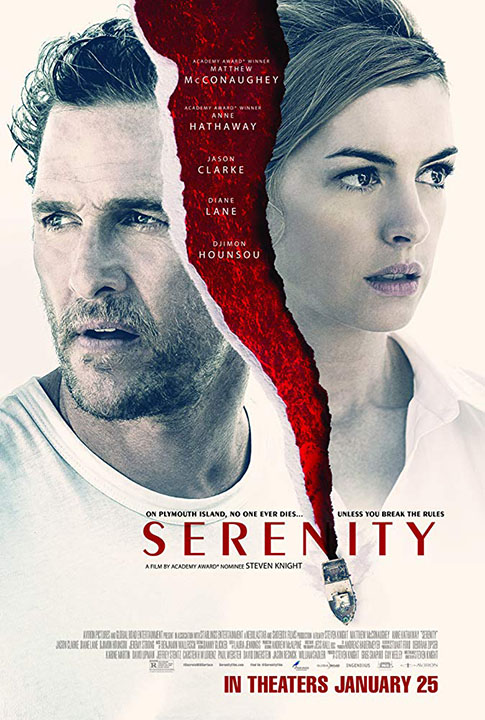
As a curiosity, the value of “Serenity” is explicit. As the subject of a review, it is more dubious. If writing about “Serenity” poses some difficulty, I’ll acknowledge that the press team behind the film had a more difficult time in trying to craft a truthful ad campaign for it. I watched the trailer for “Serenity” after seeing it. In responding to the general oddness of the film, I thought that, perhaps, seeing how it was presented to a prospective audience might answer some questions. Except, the trailer for “Serenity” is not quite an honest sell for the film we are given. It, instead, emphasises the varying and competing oddities with which Steven Knight (both writer and director) grounds his film. On its surface, “Serenity” is an erotic thriller. It’s about a very masculine boatman Baker Dill, who lives a solitary life on the sea somewhere in the tropics. The ostensible calm of this life is interrupted by a visit from his ex-wife, both femme fatale and damsel in distress. Her new husband is an abuser and she needs Dill to take him out on his boat and kill him. Otherwise she, and their son, will live a life of continued terror. That’s enough for a film. That film might be unoriginal, and somewhat seedy, but it would be a film. But, this is not the entirety of “Serenity.” “Serenity” is also a film about existential crises, the bond between parent and child, and the general pointlessness of the world. And what’s remarkable about “Serenity” is that it definitely is about all of these things while having little to say about any of them. In fact, “Serenity” performs an incredibly deft trick. It does not seem to have anything to say about… anything.
A fair amount of the conversation about the film centres on the twist that defines its second half. The thing about the twist is that it’s not so much that it comes out of leftfield, as it is that the numerous suggestions of that twist that come before its reveal are so bizarre that the audience feels compelled to reject it. The film opens with a shot of a boy’s face, zeroed in on his eyes. And we zoom into those eyes, distinctly un-emotive, and through those eyes until we are in a sea of water and come out on the other side where our film seems to really begin. That first shot tells us all we need to know, and if one considers the twists that the second half throws at us, we must acknowledge that Knight is not performing mere lurid shocks but seems wholly invested in where the film ends up.
And yet, the divorce between the first and second half of the film is so profound the telegraphing of where things will end up never quite explains what the entire point of it all is. The bigger question is whether where the film ends up has any sort of philosophical or literary value.
“Serenity” does make very much sense. But it’s hard to figure out whether sense is what it’s going for. In fact, “Serenity” is a film that seems to reject understanding or even reality. It exists somewhere beyond both. The rejection of reality might be part of its point as the film eventually makes some argument about disconnect between reality and simulations but it’s not that “Serenity” takes the very large ideas of the ineffable nature of the world’s creator and does nothing with it. Or it’s not just that. It’s the fact that “Serenity” seems to have nothing to say about anything. In the absence of narrative logic, we are left to engage with the film’s technicalities on its own terms. There is the high gloss cinematography that turns the beaches of Mauritius from idyllic to synthetic and the able cast of actors who are stuck playing in registers that are intriguing if confounding. Of the cast, Anne Hathaway as the opaque Karen is especially excellent playing a character that is more simulation than reality. But, it becomes difficult to invest in any aspect of anything happening here when the film seems uncertain if we should take any of this seriously.
There were some women behind me that began to giggle at the film’s final shot – a moment of unbridled emotion that seemed completely out of place with what came before. Usually hyper giggling at films that don’t intend to be humorous annoys me but this time around I could hardly blame them. How else to react to the hodgepodge of emotions that the film flirts with than confused giggles? Is “Serenity” bad? The film seems to reject such polarities. Should you see “Serenity”? I cannot recommend it in good faith. And, yet the unbridled earnestness with which it approaches its mounting list of implausible incidents must be seen to be truly believed. I can definitely say that “Serenity” is a movie. And, I saw it.
“Serenity” is currently playing at the Princess Movie Theaters and Caribbean Cinemas.






